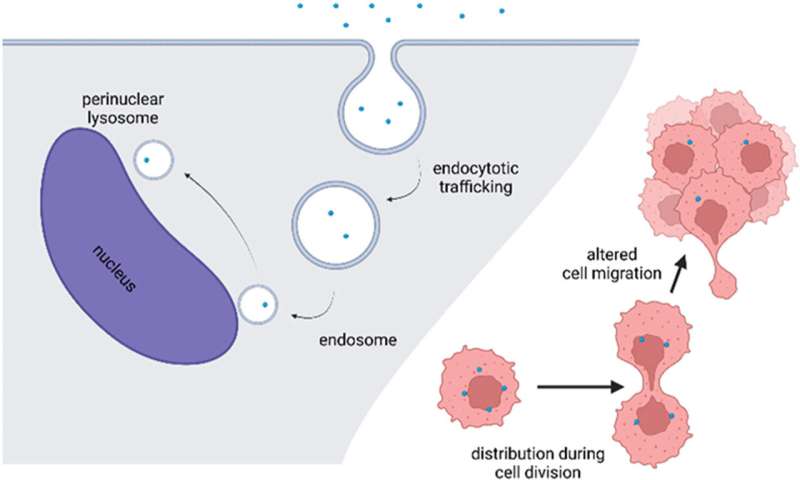This article has been reviewed according to Science X's editorial process and policies. Editors have highlighted the following attributes while ensuring the content's credibility:
fact-checked
trusted source
proofread
Micro- and nanoplastics in the body are passed on during cancer cell division, finds study

The gastrointestinal tract is already known to researchers as a major storage site for micro- and nanoplastic particles (MNPs) in the human body. A research consortium consisting of the University of Vienna, the Medical University of Vienna and other partners under the leadership of CBmed GmbH in Graz has now investigated the effects of the tiny plastic particles on cancer cells in the human gastrointestinal tract.
The study showed that MNPs remain in the cell for much longer than previously assumed, as they are passed on to the newly formed cell during cell division. The first indications that the plastic particles could promote the metastasis of tumors were also discovered. The results of the study were recently published in the journal Chemosphere.
Besides respiration, ingestion is the most important route for MNPs into the organism. Plastic particles up to the weight of a credit card (approx. 5 grams) enter the gastrointestinal tract every week. The team led by Verena Pichler (University of Vienna, CBmed) and Lukas Kenner (MedUni Vienna, CBmed, Vetmeduni Vienna) investigated the interactions between MNPs and various colon cancer cells.
In their analyses, they were not only able to show how MNPs enter the cell and where exactly they are deposited, but also observed their direct effects: The MNPs are taken up into lysosomes like other waste products in the body. Lysosomes are cell organelles that are also known as the "stomach of the cell" and break down foreign bodies in the cell. However, the researchers observed that, unlike foreign bodies of biological origin, the MNPs are not degraded due to their foreign chemical composition.
Depending on various factors, the MNPs are even passed on to the newly formed cell during cell division and are therefore likely to be more persistent in the human body than originally assumed. In addition, there are initial indications that MNPs increase the migration of cancer cells to other regions of the body and thus possibly promote the metastasis of tumors. This effect is now to be investigated further in a follow-up study.
The smaller, the more harmful
The altered behavior of colorectal cancer cells in relation to cell migration was primarily observed as a result of interaction with plastic particles that are smaller than one micrometer (1 µm = 0.001 mm). Particles of this size are usually referred to as nanoplastics, which occur 10 to 100 times more frequently than microplastics in a water bottle, for example.
It is undisputed that the smaller the plastic particles are, the more harmful they are. "This is once again consistent with the results of our analyses," says Verena Pichler. "Our study also confirms recent findings that indicate that MNPs can influence cell behavior and possibly contribute to the progression of diseases," adds Lukas Kenner.
"Given the ubiquity of plastics in the environment and the persistent exposure of even humans to the smallest plastic particles, further studies are urgently needed to investigate long-term effects in particular," says Kenner. "It can be assumed that MNP causes chronic toxicity," says Pichler.
The latest results and earlier studies show a high uptake and long retention in tissues and cells. The investigated particles therefore fulfill two of three characteristics in toxicology that are used to classify substances as being of concern under the EU Chemicals Regulation (REACH).
More information: Ekaterina Brynzak-Schreiber et al, Microplastics role in cell migration and distribution during cancer cell division, Chemosphere (2024). DOI: 10.1016/j.chemosphere.2024.141463


















